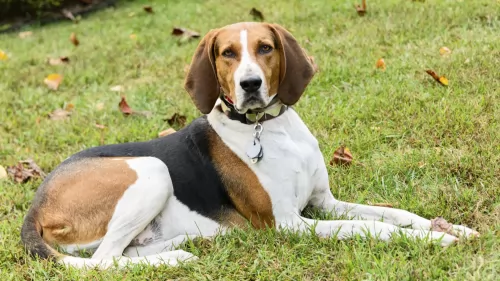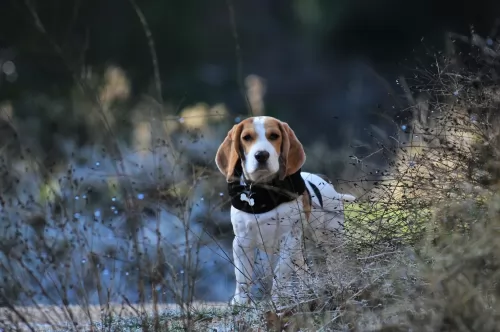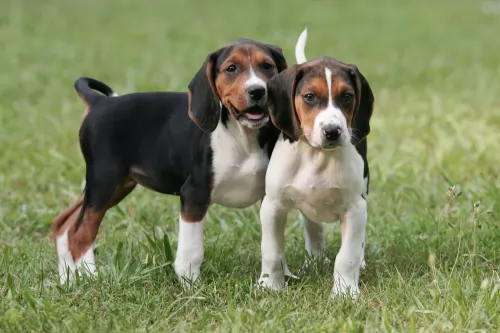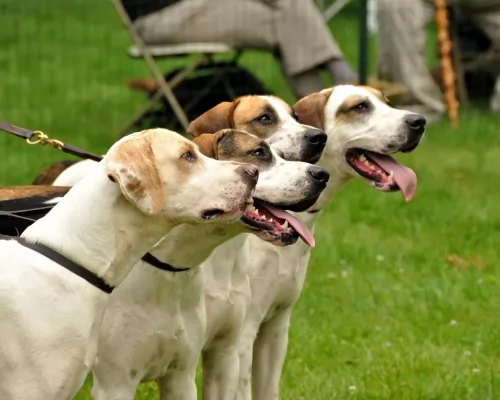 Petzlover
PetzloverAmerican English Coonhound is originated from United States but Blue Paul Terrier is originated from United Kingdom. American English Coonhound may grow 13 cm / 6 inches higher than Blue Paul Terrier. Both American English Coonhound and Blue Paul Terrier are having almost same weight. Both American English Coonhound and Blue Paul Terrier has same life span. American English Coonhound may have more litter size than Blue Paul Terrier. Both American English Coonhound and Blue Paul Terrier requires Low Maintenance.
 The American English Coonhound was developed in the Southern part of the United States from the variety of English hunting dogs that came to the States with the early settlers. At one point they were known as the Virginia Hound. This breed is well known for its prowess in hunting raccoons and her endurance and speed. Of course as a hound dog he loves to howl during the hunt and at home with the family. He can be frustrated and destructive if his energy and need for a job are not satisfied.
The American English Coonhound was developed in the Southern part of the United States from the variety of English hunting dogs that came to the States with the early settlers. At one point they were known as the Virginia Hound. This breed is well known for its prowess in hunting raccoons and her endurance and speed. Of course as a hound dog he loves to howl during the hunt and at home with the family. He can be frustrated and destructive if his energy and need for a job are not satisfied.
Known also as the Scottish Bull Terrier, the Blue Poll or the Blue Poll Bulldog, the Blue Paul Terrier’s origins, as with many unusual dog breeds, are still not known precisely. However they do appear to have been bred with Staffies at some point and appear to have slowly transformed into the Staffie or Pit Bull as we know them today.
There doesn’t seem to be much documentation on the dog’s origins, making many stories of its origins to be looked upon as folklore. It seems as if the dog originated out of Scotland. The name ‘Paul’ is included in the name simply because it is believed that John Paul Jones, who was a sailor, brought the dog to the USA in 1777.
Because this dog has superb fighting skills, it was introduced as part of Staffordshire Bull Terrier breeding in the early 19th century. It is believed that the first dogs came with English immigrants to the United Stated in the middle of the 19th century. At some time, the dog became extinct, but dates of this time can’t be established.
 The American English Coonhound is an athlete with a deep chest and cute face. They have broad heads, domed skulls, dark eyes and soft, low ears. They are as fast and athletic as they look. These are highly athletic dogs with long legs and a slim but muscular body. They are so well built for their hunting role, that any deficiencies are quickly identified and bred out of the breed.
The American English Coonhound is an athlete with a deep chest and cute face. They have broad heads, domed skulls, dark eyes and soft, low ears. They are as fast and athletic as they look. These are highly athletic dogs with long legs and a slim but muscular body. They are so well built for their hunting role, that any deficiencies are quickly identified and bred out of the breed.
The Blue Paul Terrier was a smooth coated, medium sized dog. His coat was mostly dark blue but this sometimes varied to red or brindle. He was a muscled and well built dog, much like our pit bull terriers. He weighed about 20 to 25kg kg, measuring up to 56cm at the withers. He had a broad chest, large head with small cropped ears and a tail that was set low. He is a dog that always stood strongly on his legs. It seems as if he had an aggressive nature as they were used by local dog fighters.
There is not much information on the temperament of the Blue Paul Terrier, but we can assume, that because he was a Terrier, he would have been full of character and self confidence. Most Terriers don’t actively look for a fight, but will certainly get into a fight if provoked. Aggressive by nature and a fighter, the Blue Paul Terrier possibly had some Staffordshire Bull Terrier in him, so his temperament would be that of a fighter.
He may have been able to live peacefully with children and other dogs and cats in the home, but he would no doubt have had to be raised from a puppy in such a household. Stubborn and headstrong, he would require a firm owner who could take charge of him and training would have been imperative for such a dog.
 The American English Coonhound knows how to relax just as much as he knows how to work. He is mellow after work and tenacious in the chase. This is not the dog for a first-time owner. They are stubborn and hard to train. They howl and bark at home as much as they do on the hunt. They need a strong pack leader, especially when living in the city or neighborhoods.
The American English Coonhound knows how to relax just as much as he knows how to work. He is mellow after work and tenacious in the chase. This is not the dog for a first-time owner. They are stubborn and hard to train. They howl and bark at home as much as they do on the hunt. They need a strong pack leader, especially when living in the city or neighborhoods.
They are outgoing and friendly and very sensitive. They mature later than most other breeds their size. They are about 2 when they mature.
Nobody is quite certain what the Blue Paul Terrier was like. He definitely seemed to be a mix of Pit Bull and Staffie – the same compact, muscular build with a look that speaks of confidence and boldness.
Perhaps if the Blue Paul Terrier wasn’t used for fighting, he might well have made a good pet with training and socialization. Nobody really knows. Maybe he was so aggressive that when dog fighting didn’t work out, and it was discovered that he wasn't really pet-material, nobody bothered when the breed went into extinction. That's the thing with Blue Paul Terriers, nobody is really certain about what they were really like.
 If kept active and happy, the American English Coonhound has very few health problems. The benefit from a large gen pool but do have some health concerns including elbow and hip dysplasia, ear infections, cataracts, bloat, and Progressive Retinal Atrophy. They do have a tendency to gain weight as they age. These issues will be addressed in more detail below. DNA testing is available for the dysplasia and eye issues.
If kept active and happy, the American English Coonhound has very few health problems. The benefit from a large gen pool but do have some health concerns including elbow and hip dysplasia, ear infections, cataracts, bloat, and Progressive Retinal Atrophy. They do have a tendency to gain weight as they age. These issues will be addressed in more detail below. DNA testing is available for the dysplasia and eye issues.
The Blue Paul Terrier Health was generally a healthy dog, but he would no doubt have had the same common dog ailments that most dog breeds have to contend with. All those years ago, when the Blue Paul Terrier was ill, his owner no doubt would have taken him to see the veterinarian for a full screening.
Just like with other dog breeds, he would have been watched for hip dysplasia , ticks and fleas, cataracts and skin infections. It is possible that in those days, owners of the Blue Paul Terrier weren’t aware of how plaque could cause dental problems or gum disease.
 your working American English Coonhound needs different food than one who is not working. So, if you hunt with your dog remember he really needs the calories to keep his energy up. However, they can get obese as they age so cut back with less activity and more years. Watch the number of treats when training.
your working American English Coonhound needs different food than one who is not working. So, if you hunt with your dog remember he really needs the calories to keep his energy up. However, they can get obese as they age so cut back with less activity and more years. Watch the number of treats when training.
Elbow and Hip Dysplasia – the joint issues prevent the bones from connecting and functioning properly. Any good breeder of American English Coonhounds will do tests for both.
Eye issues range from cataracts to PRA (Progressive Retinal Atrophy) Again there are tests available for these conditions.
Bloat is a condition many medium to large size dogs can experience when their stomach can become inverted and intestines distended. The is a situational issue and can’t be predicted. Don’t allow your coonhound to wolf down food right before exercise and feed him more than once a day in a smaller meal.
The American English Coonhound needs a lot of exercise and has an extremely strong work and prey drive.
Because these dogs were used in fighting, it is a breed that no doubt would have required plenty of exercise and mental stimulation to keep him fighting fit. No doubt he would have received a high quality food to build up his strength and stamina. Because he was no doubt a high energy dog, his owners would have had to give him nutritious food and ensured fresh, clean water for him.
The Blue Paul Terrier had a short, smooth coat, so they were no doubt low maintenance dogs who received a brush down every now and then to remove his loose hair.